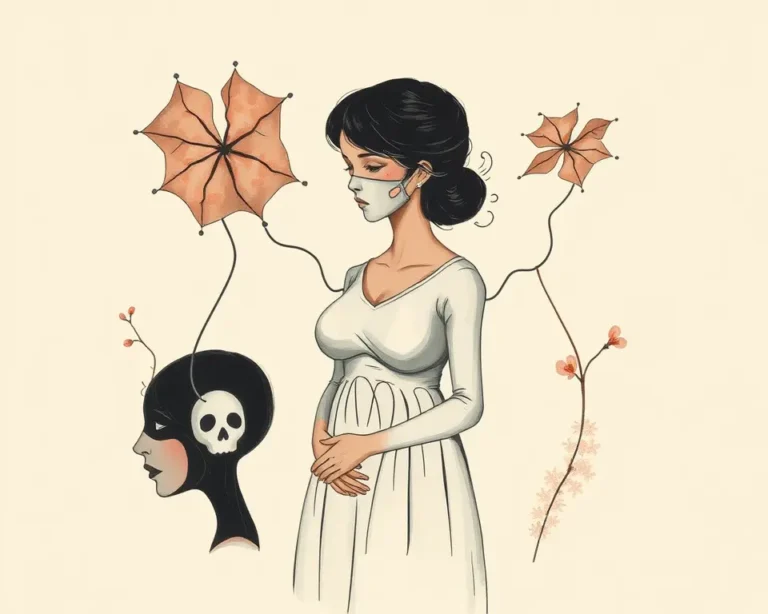In a striking campaign for Maternal Mental Health Awareness Week (May 5-11, 2025), statues across London have been adorned with ‘forced smiles’ to highlight the silent struggles faced by many mothers. This initiative, led by Peanut in partnership with Tommee Tippee and the Maternal Mental Health Alliance, aims to break the stigma surrounding maternal mental health and encourage open conversations about the challenges of motherhood.
The ‘Forced Smile’ Epidemic
The campaign draws attention to a concerning reality: a significant number of mothers feel pressured to hide their true feelings and present a facade of happiness, even when struggling with loneliness, exhaustion, or mental health issues. Research indicates that 58% of mothers feel that no one realizes how lonely they are, leading them to simply smile and carry on. This ‘forced smile’ has become an unofficial uniform of motherhood, masking the true experiences of many women.
Michelle Kennedy, CEO of Peanut, emphasizes the “insta vs reality” nature of motherhood, where mothers feel they should be perpetually happy with a healthy baby, pushing their own feelings to the side. This pressure to conform to an idealized image of motherhood can have a detrimental impact on mental health.
Loneliness and Isolation: The Unspoken Truth
Loneliness is a pervasive issue for mothers, often beginning during pregnancy and intensifying after childbirth. Studies reveal that 94% of mothers experience loneliness, with 75% encountering difficulties, including isolation, within the first three months postpartum. A survey by Tommee Tippee and Peanut found that 43% of new mothers have never disclosed how they truly feel, fearing they will be a burden or believing they should simply “get on with it”.
This silence is often driven by the stigma surrounding maternal mental health, making it difficult for mothers to seek help or express their struggles. Many feel more comfortable discussing physical challenges like perineal tears or postnatal sex than addressing their mental health or feelings of isolation.
Statues Speak Out: Raising Awareness in London
To visually represent this hidden struggle, eight statues of women in London have been fitted with yellow ‘forced smiles’. These include notable figures such as the Bronze Woman, Emmeline Pankhurst, Millicent Fawcett, and Mother and Baby. The installations serve as a powerful symbol of the pressure mothers face to appear fine while suffering in silence, sparking conversations about the need for more honest dialogue surrounding maternal mental health.
Beyond Postnatal Depression: A Spectrum of Challenges
While postnatal depression is widely recognized, it is crucial to understand that mental health challenges can arise at any point during pregnancy or within the first year after childbirth. Perinatal mental health encompasses a range of conditions, including anxiety, obsessive-compulsive disorder (OCD), and post-traumatic stress disorder (PTSD). These conditions can vary in severity and require different levels of support.
Statistics show that as many as 1 in 4 women and birthing individuals experience mental health problems during or after pregnancy, highlighting the widespread nature of these issues. It’s important to recognize that these challenges are not a sign of weakness or failure, but rather a common experience that requires understanding and support.
‘Your Voice, Your Strength’: Empowering Mothers
The theme for Maternal Mental Health Awareness Week 2025 is ‘Your voice, your strength’, emphasizing the importance of empowering women to express their needs, feelings, and experiences. A recent survey revealed that many women feel unheard regarding their mental health, underscoring the need to create space for open and honest conversations.
Encouraging mothers to share their stories and seek support is essential for breaking down stigma and promoting well-being. By sharing experiences, mothers can realize they are not alone and that help is available.
Taking Action: How to Support Maternal Mental Health
There are many ways to support mothers struggling with their mental health:
- Listen without judgment: Provide a safe space for mothers to talk openly and feel heard.
- Offer practical support: Help with household tasks, childcare, or errands to alleviate stress.
- Normalise seeking support: Encourage mothers to reach out to professionals and offer to accompany them to appointments.
- Check in regularly: Let mothers know you are there for them and offer ongoing support.
- Watch for warning signs: Be aware of serious symptoms, such as suicidal thoughts, and encourage immediate professional help if needed.
Resources and Support
Numerous organizations offer support and resources for maternal mental health:
- Maternal Mental Health Alliance: Provides information and resources for parents.
- Peanut App: Offers a community for mothers to connect and share experiences.
- Postpartum Support International (PSI): Provides support and resources for postpartum mental health.
- Mind: Offers mental health support and information.
- Samaritans: Provides a 24/7 listening service.
- CALM (the Campaign Against Living Miserably): Offers a helpline and webchat service.
- The Mix: Provides free support for people under 25.
- Rethink Mental Illness: Offers practical help and advice.
- NHS: Provides information and services for perinatal mental health.
A Call for Change
The ‘forced smiles’ campaign serves as a powerful reminder of the hidden struggles faced by many mothers. By raising awareness, promoting open conversations, and providing support, we can break the stigma surrounding maternal mental health and ensure that all mothers receive the care and understanding they deserve. Maternal Mental Health Awareness Week encourages everyone to take action and make a positive impact on the lives of mothers and their families.







